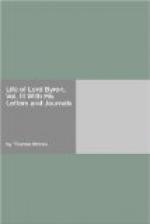“Your obliged and very obedient servant,
“BYRON.
“P.S. I do not think that I have overdrawn at Hammersley’s; but if that be the case, I can draw for the superflux on Hoare’s. The draft is 5_l._ short, but that I will make up. On payment—not before—return the copyright papers.”
* * * * *
In such a conjuncture, an appeal to his good nature and considerateness was, as Mr. Murray well judged, his best resource; and the following prompt reply, will show how easily, and at once, it succeeded.
LETTER 181. TO MR. MURRAY.
“May 1. 1814.
“Dear Sir,
“If your present note is serious, and it really would be inconvenient, there is an end of the matter; tear my draft, and go on as usual: in that case, we will recur to our former basis. That I was perfectly serious, in wishing to suppress all future publication, is true; but certainly not to interfere with the convenience of others, and more particularly your own. Some day, I will tell you the reason of this apparently strange resolution. At present, it may be enough to say that I recall it at your suggestion; and as it appears to have annoyed you, I lose no time in saying so.
“Yours truly,
“B.”
* * * * *
During my stay in town this year, we were almost daily together; and it is in no spirit of flattery to the dead I say, that the more intimately I became acquainted with his disposition and character, the more warmly I felt disposed to take an interest in every thing that concerned him. Not that, in the opportunities thus afforded me of observing more closely his defects, I did not discover much to lament, and not a little to condemn. But there was still, in the neighbourhood of even his worst faults, some atoning good quality, which was always sure, if brought kindly and with management into play, to neutralise their ill effects. The very frankness, indeed, with which he avowed his errors seemed to imply a confidence in his own power of redeeming them,—a consciousness that he could afford to be sincere. There was also, in such entire unreserve, a pledge that nothing worse remained behind; and the same quality that laid open the blemishes of his nature gave security for its honesty. “The cleanness and purity of one’s mind,” says Pope, “is never better proved than in discovering its own faults, at first view; as when a stream shows the dirt at its bottom, it shows also the transparency of the water.”




